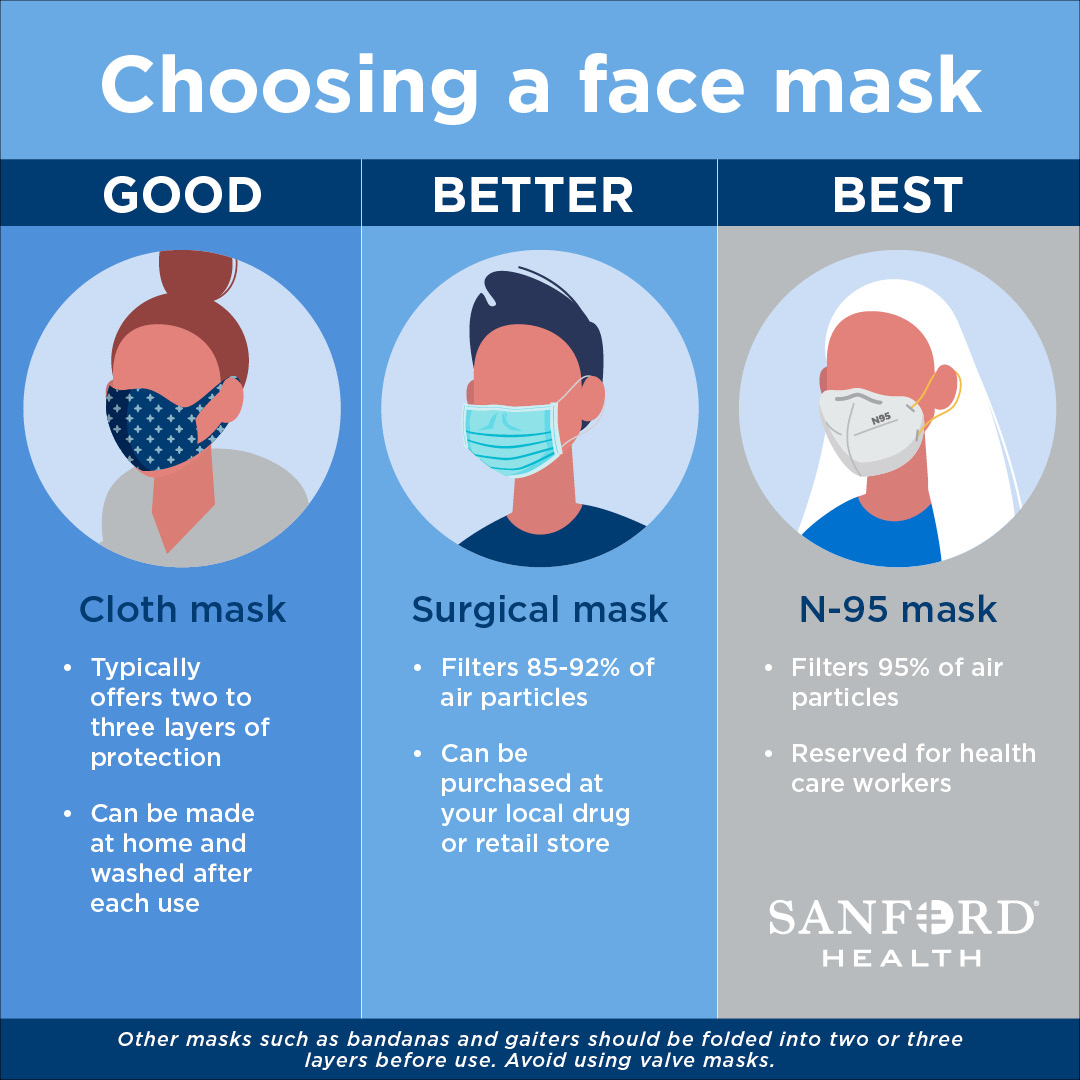Getting vaccinated and following it with a booster shot remains the best way to avoid becoming seriously ill with COVID-19 and avoid passing it on to others.
Wearing a mask is an additional way to minimize the spread of the virus. Wearing the right mask can be even more helpful.
自大流行开始以来,科学在决定我们如何安全生活的方面取得了进步。最近几周出现的欧微米变体让许多专家建议升级口罩,以对抗一种被证明会导致严重疾病的病毒株,这种病毒也被证明更具传染性。
Learn more:Latest CDC guidelines on wearing masks
The CDC is still recommending N95 masks be prioritized for health care personnel, though these days this model, approved by the National Institute of Occupational Safety and Health (NIOSH), is more available to the public than it once was.
The similarly effective KN95 masks are also available and come with recommendations from health care officials as a better way to deal with the omicron variant than disposable surgical masks and cloth masks.
All of which means it’s time for a mask upgrade.

Infographic by Sanford Health
Top-tier masks
Though many aspects of dealing with the pandemic have evolved since masks became a vital tool in addressing the spread of the virus, the N95 remains a best choice.
That’s according toDr. Santiago Lopez, pediatric infectious disease doctor at Sanford Children’s Hospital in Sioux Falls, South Dakota, andother health care experts at Sanford Health.
“N95 is the Cadillac of the mask. What it does is it filters 95% of the particles,” he said.
KN95 masks, like the N95, are made from multiple layers of synthetic material. When shopping for genuine KN95 masks, start by looking for models with a clearly marked brand name. Genuine N95 models also include an approval label on or within the packaging of the respirator.
The next-best is a surgical mask, Dr. Lopez said, and you can find them everywhere.
“根据你阅读的研究,过滤系统的过滤率为85-92%。所以,几乎和凯迪拉克(N95)一样高效。”
Best of the rest
Dr. Lopez says more layers of protection make for an effective mask. The N95, KN95 and surgical masks can have upwards of three layers, making them the best.
However, he says a cloth mask, if it includes two to three layers of protection, can be effective in reducing transmission.
布制口罩的另一个好处是,许多口罩都配有耳带,可以让口罩紧贴脸部。他说,确保适当地遮住你的脸也是至关重要的。
“It doesn’t drop down from your nose, which sometimes happens. The most important thing to remember with masks is to cover your nose and cover your mouth,” he said.
COVID-19 FAQs:Does wearing a mask affect your breathing?
接下来是大手帕。洛佩斯博士说,大手帕确实有可能有效,但最大的问题是大手帕的层数。
“What happens is that individuals only use one layer of the bandanna, instead of trying to fold them as much as they can to get two or three layers.”
Multiple folds is also what helps to raise the effectiveness of another mask, the gaiter.
What masks to avoid
Dr. Lopez says never to use a valve mask.
他说,原因是这种阀门可以让微粒释放到口罩外面。
“Those particles can be infectious to us. So, we actually do not recommend any type of mask that has an exhale valve.”
Why masks are important
The CDC continues to recommend wearing a mask in public indoor settings in areas of substantial or high community transmission regardless of vaccination status.
“When you can, be 6 feet away from the next person, if possible,” Dr. Lopez says. “Try to avoid crowded places, particularly indoor gatherings, but also outdoor gatherings that are really crowded. Also, it’s important to practice proper hand washing.”
Masks help keep infectious droplets from spreading the virus that’s claimed millions of lives worldwide.
Besides COVID-19 vaccines, “wearing a mask is one of the most important health tools that we have in fighting the spread of the virus.”
And, even if you’ve already had the coronavirus, you should still wear a mask and maintain physical distance toprevent spreading COVID-19 and the flu, says Sanford Health chief physician Jeremy Cauwels, M.D.
Information in this story was accurate when it was posted. As the COVID-19 pandemic changes, scientific understanding and guidelines may have changed since the original publication date.
Learn more
- Booster dose builds immunity as omicron variant spreads
- 什么样的口罩最好?Ask an infectious disease doctor
- As COVID testing options increase, communication should too
…

